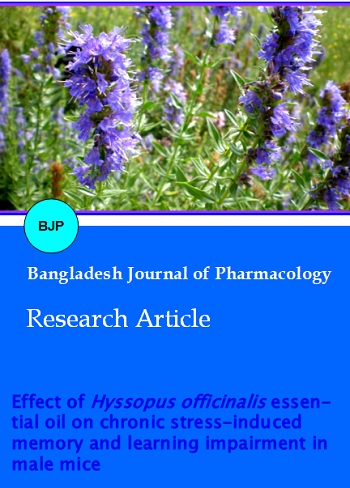Effect of Hyssopus officinalis essential oil on chronic stress-induced memory and learning impairment in male mice
DOI:
https://doi.org/10.3329/bjp.v12i4.33585Keywords:
Chronic stress, Essential oil, Hyssopus officinalis, Learning, Memory, MiceAbstract
The present study investigated the effect of H. officinalis essential oil on avoidance memory in chronic stress-induced. Mice were exposed to chronic immobilization stress and were treated with H. officinalis essential oil for 21 days. Memory and learning were measured using shuttle box. The serum levels of corticosterone, malondialdehyde, antioxidant capacity, brain malondialdehyde level and antioxidant capacity were measured. Treatment with 75 mg/kg of H. officinalis essential oil caused a significant increase in t2 duration under chronic stress. Serum and brain malondialdehyde levels significantly decreased under stress treated with 75 mg/kg of H. officinalis essential oil. Brain and serum antioxidant capacity significantly increased under stress treated with 75 mg/kg of H. officinalis essential oil. The group that received 75 mg/kg of H. officinalis essential oil (inside the restrainer) had insignificantly lower serum corticosterone levels. H. officinalis essential oil has anti-anxiety effects and can promote memory and learning under chronic immobilization stress.
Video Clip of Methodology:
Avoidance memory test (t1): 0 min 44 sec: Click to watch
Avoidance memory test (t2): 1 min 2 sec: Click to watch
Downloads
167
182 Read
45

Published
How to Cite
Issue
Section
License
Authors who publish with this journal agree to the following terms:
- Authors retain copyright and grant the journal right of first publication with the work simultaneously licensed under a Creative Commons Attribution License that allows others to share the work with an acknowledgement of the work's authorship and initial publication in this journal.
- Authors are able to enter into separate, additional contractual arrangements for the non-exclusive distribution of the journal's published version of the work (e.g., post it to an institutional repository or publish it in a book), with an acknowledgement of its initial publication in this journal.
- Authors are permitted and encouraged to post their work online (e.g., in institutional repositories or on their website) prior to and during the submission process, as it can lead to productive exchanges, as well as earlier and greater citation of published work (See The Effect of Open Access).
